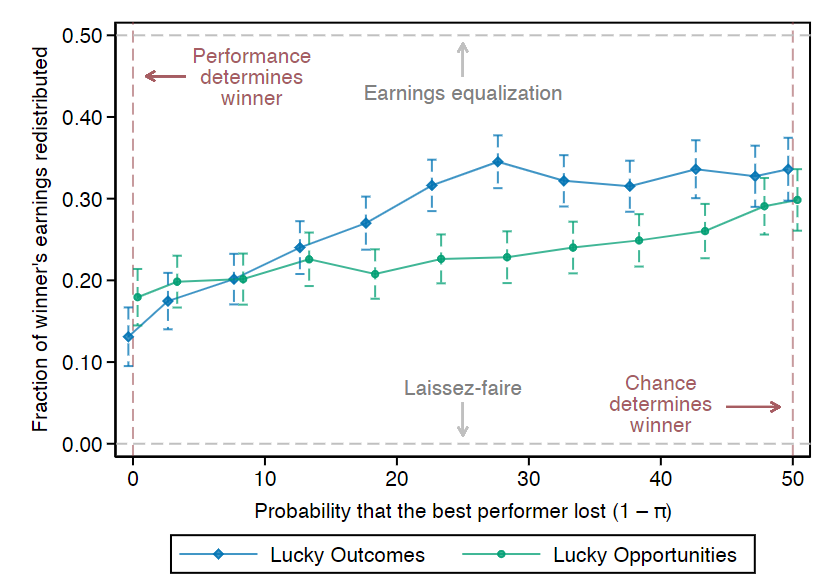The impact of circumstances beyond people’s control has been rising in the United States, yet support for redistribution policies remains stagnant. This puzzling trend contradicts experimental findings that suggest people generally favor meritocratic fairness—tolerating income differences due to effort but supporting redistribution when disparities result from luck.
A new IZA discussion paper by Marcel Preuss, Germán Reyes, Jason Somerville and Joy Wu sheds light on this apparent disconnect by examining how different types of luck influence attitudes toward redistribution.
The authors conducted an experiment involving 2,400 workers who completed a real-effort task and randomly paired them to compete for a fixed prize in a winner-takes-all environment. Then, 1,170 impartial “spectators,” recruited from the New York Fed’s Survey of Consumer Expectations, decided how to allocate earnings between worker pairs.
Lucky outcomes vs. lucky opportunities
Spectators were randomly assigned to either a “lucky outcomes” scenario (where the winner of each pair was determined by coin flip or task performance) or a “lucky opportunities” scenario (where the winner was determined by task performance multiplied by a random productivity factor). This design allowed the authors to compare redistribution decisions across different luck environments while controlling for the overall impact of luck on outcomes.
The authors found that spectators redistributed significantly less earnings when inequality arose from lucky opportunities compared to lucky outcomes. On average, they redistributed 27.6% of earnings under lucky outcomes but only 23.3% under lucky opportunities.
This redistribution gap emerged only when there was uncertainty about whether the higher-performing worker lost. As the probability that earnings inequality was due to luck increased, redistribution increased more strongly in the lucky outcomes scenario compared to the lucky opportunities scenario (Figure 1).
Figure 1:
Average redistribution and the probability that earnings inequality is due to luck

To understand why spectators redistribute less under lucky opportunities, the researchers examined how spectators use information from the different luck environments. They found that under unequal opportunities, spectators tended to respond linearly to differences in productivity multipliers. While intuitive, this behavior often leads to underestimating how even small differences in opportunities can substantially impact worker outcomes.
To further investigate this phenomenon, the researchers conducted an information intervention where they directly provided spectators with the probability that the best performer won. This intervention significantly reduced the redistribution gap between lucky outcomes and lucky opportunities scenarios.
Difficulty in assessing the true impact of luck
When given explicit information about the role of luck, spectators in both scenarios became more responsive to changes in the likelihood that earnings inequality was due to luck. This finding suggests that spectators faced difficulties in accurately assessing the impact of unequal opportunities on earnings inequality.
These findings have important implications for understanding attitudes toward inequality and designing effective redistribution policies. They suggest that people may be more tolerant of inequality arising from unequal opportunities, partly due to the difficulty in assessing the true impact of luck in such situations. This could help explain why support for redistribution in the U.S. has remained stagnant despite increasing inequality of opportunity.
The results highlight the need for clear communication about the role of luck in determining economic outcomes and suggest that models of redistribution preferences should account for how people process information about different sources of luck.
